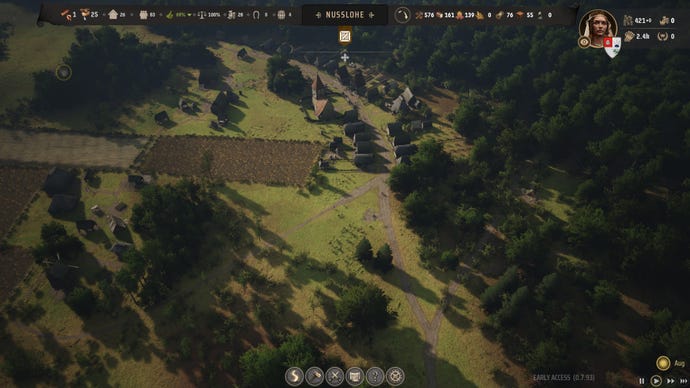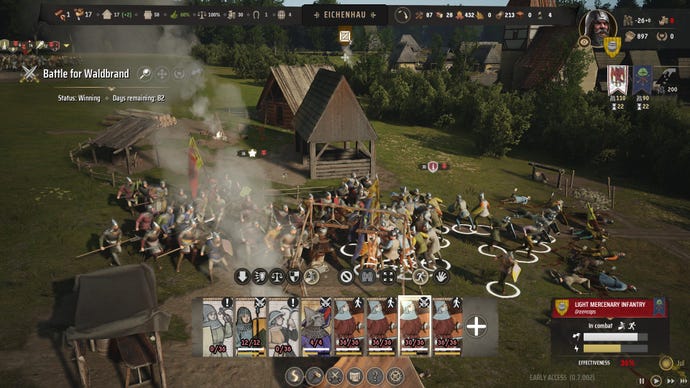When you build your first manor house in the city-building simulation Manor Lords, it seems natural to place it in the center of your modest 14th-century European settlement. It presents itself as a seat of power, where your avatar lives. And it’s right there in the title. I built mine on a side road, between ox posts and granaries, for no particular reason but to have some space. The more I play, the more it seems like the right place. Not out of the way, exactly, just not particularly clamorous. I need the taxes it brings in to pay my mercenaries to keep out bandits, but the lords – their whims and ambitions – don’t set the tone here. Parchment and seals aren’t as vital as tilled land; they’re like winter snows, spring thaws, and autumn harvests. So, despite the title, this peaceful, compelling, and intricate simulation isn’t really about lords or manors. Or at least not half as much as manure.
Or at least things adjacent to manure. Farming. Cattle. Manor Lords has an earthy, knee-jerk presence about the land that hovers throughout, despite the genre’s usual sterile concerns about efficiency and logistics that sometimes do their best to hide it. There are still spreadsheets and checklists, sometimes literally for the trade or housing needs of your population, here represented as individual families, each assigned to their own task or structure. There are also supplies and survival items. A helpful UI icon condenses all the various food items—vegetables from the garden or hunted wild deer, honey or bread—into a single counter of how many months your settlement could survive if everything came to a halt. It’s all engaging enough to optimize, to be sure. But the real driving force is watching things grow and blossom from a handful of tents and dirt roads into a place so spirited, prospering, and rustic that you can almost smell the hay and manure.
This may be a ecstatic coincidence of Early Access, where the goals of survival or conquest of territory exist but lack enough additional progression systems to make them seem particularly enticing, at least compared to the meditative and curious digital care that Manor Lords’ true joys lie in. On the map level, of course. There are opposing forces and regions to lay claim to. But on the ground level, you’re encouraged to exist alongside your surroundings, not overpower them. Hunt hungrily, and soon there’s nothing left to hunt. Chop down trees without planting more, and soon you’ll see the forests shrink. Force the soil to perpetually provide, with no time to fallow, and all your efforts to grow, grind, and earn that good bread will be wasted.
Have you ever owned a bread machine? Life-changing advice: put one on before you go to the pub. Skip the kebab and come home half-sliced, smelling like a freshly baked loaf that you can immediately devour in a blissful frenzy. I recalled this unique joy when I decided that since explaining every intricacy of the game would be exhausting, beer and bread provided a good lens. To improve your townspeople’s plots – houses, really – you need to meet the housing needs of the families living on them. It starts out basic. Water from a well, a church, a few different foods. Clothing is more hard, but hunted game provides hides, so place a tannery and you’ll have everything sorted out. But eventually, as with many civilizations, God stops listening and everyone wants to get pissed off.
When it comes to beer, you first need to find fertile land specifically for barley, as each of the four crops has different needs. Then you need to place and populate a farmhouse, perhaps with designated oxen for faster cultivation if you have the upgrade. When autumn comes, you’ll harvest and transport the barley to another building that will turn it into malt. Finally, you’ll transport it to a tavern, although you can turn the townspeople’s plot into a brewery, which still functions as a residence but prevents the family living there from taking on other jobs. When it comes to bread, you’ll grow wheat, then the farmhouse will turn it into grain, the miller into flour, and finally the parish into bread. All the while, you’ll need to maintain separate buildings fueled by firewood, and ideally have oxen and guides to transport everything so that the villagers with handcarts don’t have to do it much slower.

So, it’s a few buildings and maybe a dozen families, so that everyone has only one food item and the occasional beer. I think it’s this, even more than the wattle and daub houses and the monks’ diets, that makes it all seem modest, even in such a technically wealthy and lavish digital world. There are no real incentives to accumulate wealth, beyond mercenary insurance to keep your village unthreatening, no options for luxury or even decoration, beyond a few basic cosmetics. The joy is here, where aesthetics and asceticism meet: rows of well-fed, hot homes. Sensible road networks bustling with foot traffic and the hooves of diminutive businesses. All of these make modesty seem like a worthwhile achievement.
At times, this feels like an accomplishment, as Manor Lords feels deliberately obtuse, though never pointless. Your residents have minds of their own, so while you can assign tasks and priorities, you can never fully plan individual routines. After one harvest season, my mill and furnace simply refused to start producing again, despite the many workers assigned to each. All that was needed to block the pipeline was to set one of the five fields to “high” priority instead of “medium.” Of course, you’ll have the luxury of an RPS stuffed to the brim with life-changing guides. But my first few sessions were basically just learning the ropes, as the most obvious omission of this Early Access experience is a proper tutorial.
There is a military industry, but I don’t see myself ever really getting into it unless I’m forced to. Mercenaries are capable and plentiful enough to meet my needs, which are to build in peace and occasionally hand out spears to the baker and pals so they can attack a bandit camp, which gives me enough money to start another trade route. We really do grow some nice carrots around here and I’d like to see more people try them.

When Manor Lords requires violence, it’s Total War combat without the context of the series. Put bows behind spears. Don’t push your guys too strenuous, or they’ll tire out and fight worse. That’s very impressive, but it almost feels like Total War by accident to me. That is, a continuation of the ethos found elsewhere; of course you can see every single fighter, because we’re not abstracting here if we can avoid it. The most exhilarating thing about the combat is the music, which means the combat is pretty good – the music is excellent.
The real personality of Manor Lords isn’t in its conflicts, but in the place where it transforms from a very pretty logistical puzzle into something more peculiar; where life emerges from the blueprints like a summer sun from behind a plastic globe. During harvest season, you’ll want to take families from other occupations and assign them to the farm, and just sit back and watch as hunters, traders, millers, and miners gather in the year’s crops, the entire village working as one. Elsewhere, the nuances of life give way to an abstraction that would otherwise be avoided. No street fights over stolen goats. No accusations of witchcraft. Public order isn’t really an issue. Disease seems minimal and underdeveloped. But that’s part of the deal at this point. I’m not entirely sure what kind of game this wants to be, beyond one that feels solid and real and compelling, but I can’t wait to find out.
The main challenge Manor Lords faces as it progresses through Early Access is, I think, how to be more limpid about its inner workings without fully revealing its cards; diluting some of its magic. I don’t want to know exactly what the ants on the farm are thinking as they carry leaves back and forth, but I’d probably like to find out a little faster why they’ve all suddenly stopped. And to some extent, I think understanding those inner workings is part of the intended challenge. It might seem like an unusual thing to hide in a management sim, but then again, Manor Lords is a much more unusual game than it might seem at first glance. It definitely doesn’t feel anywhere near finished, but it feels alive. That’s much more vital.
This review was prepared based on the version of the game provided by the developers.

